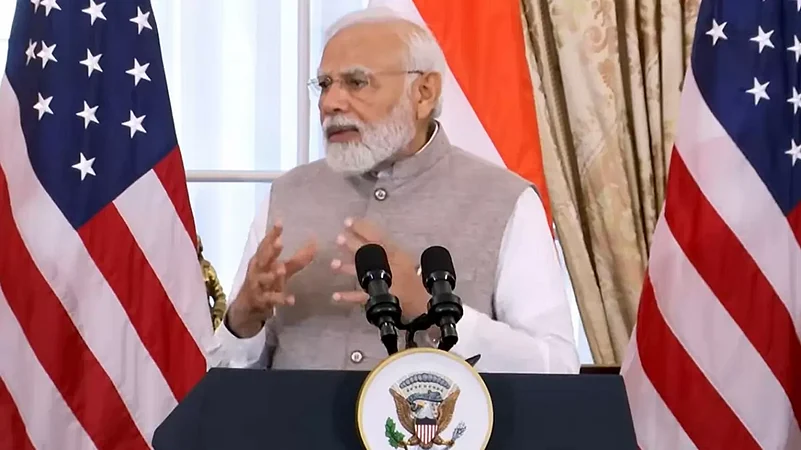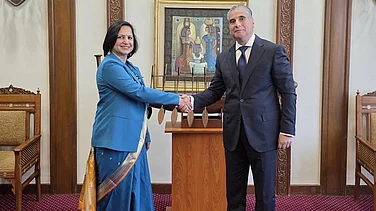To begin with, India’s economic relationship with the US is booming. India and the United States have forged a new era of cooperation with the signing of several groundbreaking agreements during Prime Minister Modi's historic visit to the United States. These agreements span across defense technology, defense cooperation, artificial intelligence, and other key areas of collaboration, heralding a significant milestone in the bilateral relationship.
A major highlight of the joint statement between the United States and India is the signing of a Memorandum of Agreement (MoA) between General Electric (GE) and Hindustan Aeronautics Limited (HAL). This MoA paves the way for the fabrication of GE F414 jet engines in India, specifically for the Light Combat Aircraft (LCA) Mk2. The manufacturing licensing contract has been submitted for Congressional notification, as stated in the fact sheet released by the United States.
Furthermore, the long-awaited Basic Exchange and Collaboration Agreement (BECA) for geospatial collaboration have also been successfully signed between India and the United States of America. This agreement will enable the supply of sophisticated technology and immediate intelligence and information, empowering India to leverage American geospatial data for precise and accurate targeting of enemy threats.
As part of the defense agreement signed at the third session of the 2+2 ministerial dialogue, India will be acquiring advanced military equipment from the United States. The Indian Navy will receive 15 SeaGuardian drones, while the Indian Army and Indian Air Force (IAF) will each be equipped with eight SkyGuardian ground variants. These acquisitions will fortify India's defense capabilities and contribute to the nation's security.
In a significant development, GE Aerospace Company will establish an engine manufacturing plant in India. This move will mark the production of fighter jet engines within the country, with the F414 engine for the Indian Air Force's Tejas Mk2 fighter jet being manufactured by GE Aerospace in collaboration with HAL.
Furthermore, the United States has signed Memoranda of Understanding (MoUs) with two Indian startups, 114AI and 3rdiTech, marking the launch of the US-India Defense Acceleration Ecosystem (INDUS-X). This collaborative network will comprise universities, startups, industries, and think tanks from both countries, fostering innovation and facilitating the exchange of defense-related technologies.
The Initiative on Critical and Emerging Technology (iCET) between India and the United States has also been officially announced during this visit. This initiative, which began earlier this year, emphasizes the sharing and safeguarding of complex technologies between the two nations.
In a significant move to enhance India's security, the purchase of MQ-9 Reaper combat drones from the United States has been sealed. These drones will play a vital role in safeguarding the Indian Ocean, the Chinese border, and other international borders. The agreement entails the acquisition of 30 combat drones for Rs 29,000 crore, marking a substantial investment by India. The pilot project will be followed by indigenous production after incorporating feedback from the armed forces.
The Associated Chambers of Commerce and Industry of India (ASSOCHAM) acknowledges the immense impact of this visit on the defense sector. This historic collaboration between India and the United States of America will elevate our defense system to unprecedented heights. The substantial investment involved will facilitate the growth of the Indian military and defense sector, charting a path towards progress. Through this collaboration, our defense system will gain significant strength, bringing us closer to realizing our vision of a stronger and more prosperous nation.
The groundbreaking proposal by General Electric (GE) to manufacture F414 jet engines in India has been warmly received by both the United States and India. The signing of a memorandum of understanding (MOU) between GE and Hindustan Aeronautics Limited is a significant advancement in this effort, and an export license agreement has already been submitted for congressional notification.
The signing of these foundational agreements signifies a new chapter in the strategic partnership between India and the United States. The collaboration will not only enhance defense capabilities but also foster technological innovation, economic growth, and shared prosperity for India and embolden its position in the new world order.
The article is written by ASSOCHAM Defence Council


















.png?w=200&auto=format%2Ccompress&fit=max)






